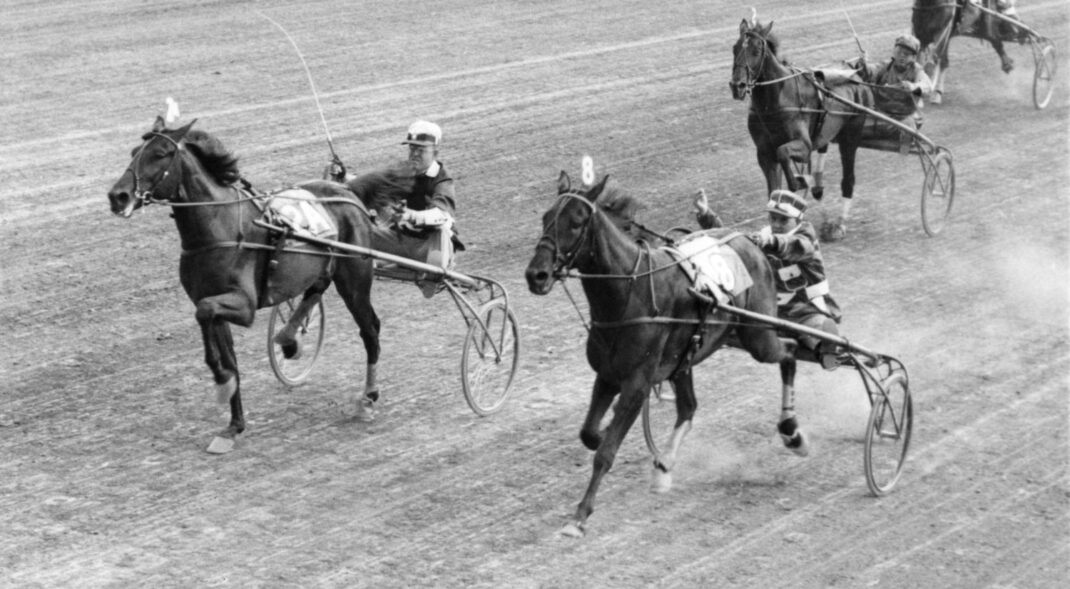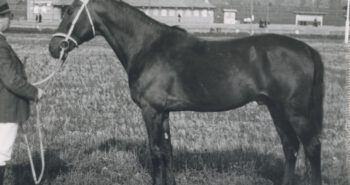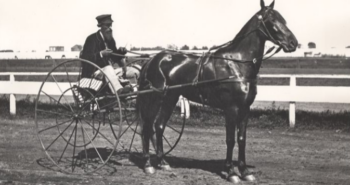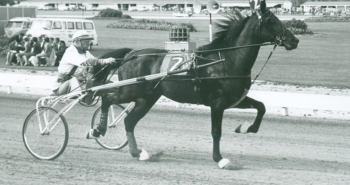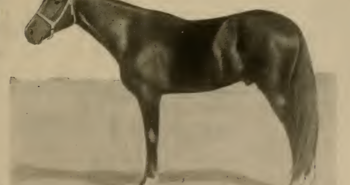A very good trotter and world champion, he was initially deemed not good to stand stud at Hanover Shoe Farms and sold to Europe. When his Italian buy failed to pay, Star’s Pride was given a small opportunity at stud at the famed nursey. Despite the lack of confidence and not being given the best mares, the colt immdiately showed himself as a spectacular stallion – maybe the best in history.
Sep Palin trained Greyhound while Jimmy Wingfield groomed him. In 1948 they were at the yearling auction in Indianapolis; Palin was running the sale and Wingfield was there as a buyer. When the latter kept bidding on a Worthy Boy yearling colt, only to face breeder Harry Warwick, who kept bidding up the price of his own product, Palin saw Wingfield have the highest bid at $2,950 and told Warwick, “Let the boy have the colt, he’ll do alright with him” to which Warwick actually agreed and stopped bidding to push up the price. Thus one of the most legendary horses of all times got sold relatively cheaply.
Neither Palin nor Warwick knew, however, that Wingfield was just proxy bidding for another trainer, Harry Pownall, who in turn was acting for E Roland Harriman’s Arden Homestead – who would later sell half of the horse in question, Star’s Pride, to Lawrence Sheppard of Hanover Shoe Farm. Later Warwick admitted being very upset when he learned this, thinking he could probably have forced the price higher given that the buyer wasn’t exactly short of cash. In reality, though, Wingfield had only been authorized to go to $2,500, although Pownall had added that “don’t let a couple houndred stop you,” something which Wingfield interpreted rather liberally. The coincidences didn’t stop there, though. Pownall had come to the auction to buy fillies and when his old friend Sam Berger, who worked for Warwick, suggested he take a look at Star’s Pride he did so more out of courtesy than a genuine interest in the colt – until he saw him, that was. Pownall found Star’s Pride to be a very nice yearling and was instantly attracted to him. Since he couldn’t be there for the whole auction he asked Wingfield to bid on Star’s Pride for him. When Pownall heard that Wingfield had gone over the limit by more than a couple hundred he was not too happy, but fortunately Harriman had no problems ok’ing the purchase.
Natural talent
Star’s Pride stayed in Indianapolis with Sep Palin and his assistant Jimmy Laughlin, the latter giving the young colt his first lessons. He looked nothing like the star he would later become, though, as he was more sick than fit for fight, and initially could not keep up with the other two-year-olds. Shipping to Florida in February as a two-year-old, Pownall took an immediate liking to the Worthy Boy-son. It didn’t take long for Pownall to spot the young colt’s natural talent. Later he would remark that “I never had a colt that could do it as easy as he did. I thought right then that he was a top colt.” Under Pownall’s expert tutelage Star’s Pride progressed rapidly and eventually caught up with his contemporaries. Pownall trained him to a mile in 2:14 (1.23,3) at the Goshen historic track and then him shipped to Saratoga – where the unfortunate fella contracted shipping sickness. He made his debut at Saratoga on July 15, 1949, where he won in 2:13.4 (1.23,2). After another two starts at Saratoga, he started in the Tompkins Memorial back at Goshen where he was driven by Lawrence Sheppard himself. Star’s Pride finished 2-3 behind Lusty Song, who won both heats, the colt trotting the second in roughly 2:04 (1.17,1).
Star’s Pride got the better of Lusty Song in the Delaware Gazette a few weeks later, winning both heats ahead of the son of Volomite. He finished up his two-year-old season splitting heats with stablemate Florican in a $5,000 trot in Lexington. Pownall planned to lower his 2:06.2 (1.18,6) record in a time trial the following week, but when the colt began coughing the plans were discarded. Star’s Pride went into winter training with $11,500 in earnings after being 3-1-1 in 7 starts at 2. While Lusty Song was universally regarded as the best two-year-old, Florican was almost as universally regarded as the second best with Star’s Pride a close third.
Second in the Hambletonian
While Florican might have been slightly better than Star’s Pride at 2, the following season the tables were turned, though it might not have looked it early in the season. After losing to Volo AC on his seasonal debut, Star’s Pride then made breaks in 2 races. Pownall knew something was wrong: “Something was hurting him, it wasn’t like him to make first turn breaks.” But before they could figure it out the problems disappeared and he won at both Goshen and Saratoga. This was enough to draw the attention of Frances Dodge van Lennep at Castleton, who offered $60,000 for the horse, but when the ownership duo asked for $75,000 she dropped it. The week before Hambletonian, Pownall trained him in 2:03 (1.16,)4, but in the race he still couldn’t get the better of Lusty Song who won both heats. In the first heat Lusty Song quickly took the lead and even though he tried as best he could, Star’s Pride was beat by a length. The second heat mirrored the first as Lusty Song took the lead while Star’s Pride, often a slow starter, had to work his way around horses. Down the stretch Star’s Pride put in a valiant effort but Lusty Song held on to win by a long nose.
While Florican stuck to racing against his contemporaries in the weeks prior to the Lexington meet, Star’s Pride instead took on older horses and met a formidable opponent in Del Miller’s Pronto Don. At Springfield he finished second to Del Miller’s protege but was timed in just below 2 minutes in the second heat when he lost by a small margin. At DuQuoin he beat all the top 3-year-olds, including Lusty Song, to win the Championship Stallion Stake. After unsuccessfully taking on older horses at Delaware and in the Walnut Hall Cup at Lexington he showed his superiority in the class of 1947 by winning the 1950 Kentucky Fururity in two straight heat, the second in 2:02 (1.15,8), his three-year-old record. He went into winter training after a final win of the season in the Matron at Toledo.
Numerous world records
He opened his 4-year-old campaign with two starts at Toledo, winning one in such supreme fashion that Pownall felt “he convinced me then that I had a two-minute horse in the making.” It wouldn’t take long for Star’s Pride to prove him right and over the next two months he would set several track and world records and “help” some of his competitors to do the same.
At Roosevelt he finished second to Demon Hanover in 3:06.2 (1.17,2) for a mile and a half race. Demon Hanover’s win was a world’s record. A week later the tables were turned as Star’s Pride beat Demon Hanover and for good measure lowered the world record to 3:06.1 (1.17,1). Back at Goshen he met his old nemesis Pronto Don and won in straight heats in 2:01.1 and 2:02.3 (1.15,3 and 1.16,2). The first heat was a new race record for a trotting stallion on half-mile tracks and the race set a new two-heat world record. A week later he lowered the world record on half-mile tracks to 2:00.3 (1.15,0). The following week Star’s Pride got stuck on the outside and finished fifth to Pronto Don, who won in 2:02 (1.15,8), a world’s record for geldings. At the mile track at Goshen, Star’s Pride delivered on Pownall’s conviction as he won a heat of the Trotting Derby in 1:59.1 ( 1.14,1) and another at Indianapolis in 1:59 (1.14,0). Back at Roosevelt for a 2-mile-race, he finished third to Pronto Don and Demon Hanover when the former set a new world record in 4:10.4. After several monumental efforts, the bubble burst a bit and after a couple of starts at Lexington and California Star’s Pride again went into winter training.
A year earlier Pownall felt that Star’s Pride could break the 2-minute barrier but now he set his sights higher, noting that “during the past winter Star’s Pride continued to develop into a handsome, masculine horse. I personally thought, and mentioned to different people, that if he continued to show the same improvement this year as he had each year in the past, he stood a good chance of lowering the stallion record.” Nowadays the “stallion record” isn’t a separate record but back then it was a big deal and the record in question, 1:57 1/4 (1.12,9), belonged to Spencer Scott.
An intelligent horse
In March that lofty goal seemed very unlikely, though, as three separate quarter cracks sidelined him. Yet these cracks gave Pownall a chance to see how highly intelligent Star’s Pride was. He would jog the wrong way of the track but refused to turn up with the trainer asked him to do so. “He was an intelligent horse and suddenly the thought came to me that Star’s Pride was trying to tell me that he simply wasn’t ready to go training miles,” Pownall would comment later. They kept training him despite three cracks on two different feet, though, but only jogging slowly. “Although he favored the injuries, he never took a lame step. We let up on him some but still trained him lightly, around the 2:25 (1.30,1) notch” Pownall commented.
The quarter cracks also indirectly lead to an equipment change. As Pownall explained, “we were quite successful in treating the quarter cracks. Blacksmith Henry Benner worked wonders in Florida and blacksmith Bill Sharp and my old friend Dr Jim Letterny did a fine job when we got back to Goshen. Then, while we were training Star’s Pride these slow trips he got in the habit of stopping during his jogging miles and looking around. We let him do it and before we knew it he was in the habit of balking when we wanted him to go on. The result was that I had to put a blind bridle on him. At three and four he had raced with the open bridle but now we went back to the blind bridle and the trouble stopped.”
And just as the multiple world record holder had told Pownall when things were wrong, he let his feet do the talking when things returned to normal.
“Just to show you what kind of a horse he was,” Pownall said, “Harold Miller was training him one day and he hadn’t beat 2:20 (1.27) for four weeks, since he developed the quarter cracks. This particular day he grabbed hold and went a mile in 2:14 1/2 (1.23,6), just jogging. It shows you what kind of a horse he was. And what great horses will do off nothing.”The next week Pownall intended to train in 2:20 (1.27) and gradually upping the speed but the Worthy Boy-son had more to tell his trainer. Despite Pownall’s intention to take it slow, Star’s Pride tore away and completed the mile in 2:09 (1.20,2), not even taking a deep breath as he went back to the barn. “It dawned on me that Star’s Pride was saying ‘Alright, I’m okay now and ready to train’,” Pownall stated later.
One final world record
He made his 1952 debut at the Goshen half-mile oval and won the first heat from Pronto Don but lost the second heat, and race, to the same horse. Then at Saratoga he was twice second to the same horse yet again. Over a muddy track at Springfield he trotted the mile in 2:00 /1.14,6 and when a tornado cancelled the racing at Sedalia, Star’s Pride was shipped to DuQuoin together with Florican. With ten days to prepare and a fast track facing them, Pownall realized he would never get a better shot at Spencer Scott’s stallion record. In his own words as told to Hoof Beats: “Del and I trained them Saturday figuring that perhaps the time had arrived for the record attempt. We went our first training mile in 2:02 1/2 (1.16,1), last half in 57.4 and the second mile in 2:01 (1.15,2), last half in 59 seconds. Due to the fact that it was doubtful whether Pronto Don would start, I made it a point to ask Gene Hayes whether he thought the free for all trot would fill. ‘Yes,’ he told me, ‘I believe it will fill and I hope you’ll give the people a good race for their money.’ So I told him that if the day and track were good, we’d go right along. I drew the pole with Star’s Pride and Del was in second with Florican. Scotch Rhythm was also in. Before the beat I told Del I was going to cut out a wicked clip but that I wasn’t going to give him anything at the end. I told him that if he was going to win, he’d have to win it by himself because Star’s Pride and I would still be trying. Well, that’s what happened. I went to the quarter in 29.4, to the half in 59.3 and the three quarters in 1:29. Del came out there and Florican won it, but not by much. And in 1:57.2 (1.13,0). In the second heat, Florican and Del went to the quarters in :29.4, :58.3 and 1:27.2. Star’s Pride came off that clip to go in 1:57.1 ( 1.12,8). That was the climax to one of the most memorable days of my life.”
The two stablemates would get one more shot at each other. At Indianapolis Florican took the first heat only to see Star’s Pride take the other two, the third in 2:00 (1.14,6). In that race, according to Pownall, Star’s Pride showed incredible resilience: “Florican had won the first heat on his own merit but in the second heat Star’s Pride acted to me as though he was trying to show Florican that he couldn’t get the job done again. He just wouldn’t let Florican get to him in the stretch. In the third heat I planned to hit the half in about 1:05 and let the best-horse win from there. But Star’s Pride would have none of it. He wanted to go on, insisted that I give him his head. As a consequence, we got to the half in 1:01 and Star’s Pride won the heat in 2.00 (1.14,6). He was all trot that day.” He was then down to beat his own record at Lexington but was a bit sore and the weather took a turn for the worse when it came time to go. Pownall then decided to call it a day on Star’s Pride racing career.
A European deal
Star’s Pride retired to stud 21-15-6 in 47 races, although his career record is often quoted as 36-28-5 in 79 and that is correct for individual heats. He earned $140,969 and set multiple world records. But despite this, standing Star’s Pride at stud at Hanover wasn’t at first an option for Sheppard as there were numerous reasons to be skeptical. Firstly he was by a sire, Worthy Boy, who was, at best, considered average and tended to throw more pacers than trotters. Star’s Pride was also short coupled and looked more like a pacer than a trotter. On top of that he would regularly hit his shins and did not appear to have the best feet. Those were the negatives about Star’s Pride himself. Toss in that Hanover already stood a formidable quartet of trotting stallions in Hoot Mon, Dean Hanover, Titan Hanover and Nibble Hanover, it is easy to see why a bid of $25,000 from Italian buyers in late 1952 was accepted. But in the end, the Italian buyers weren’t able, or maybe not willing, to pony up the dough. That more or less forced Sheppard to stand him at Hanover for the next couple of seasons. Star’s Pride were given a very limited number of mares to service – not to mention these weren’t mares of the highest quality, either, but as the saying goes: cream always rises to the top.
A spectacular sire
His first crop contained 21 foals – all of whom started (!) and the now-forgotten Section Man finished 2-2 in the 1957 Hambletonian (but fourth overall because there were so many entrants that year). The second crop contained 16 horses, of whom 15 started, and included Emily’s Pride and Little Rocky, first and second in the 1958 Hambletonian. The third crop was even more impressive as it contained just 9 horses but all started and it contained Diller Hanover, 1959 Hambletonian winner. It was, however, universally agreed that Diller Hanover would not have won the Hambletonian had Hickory Pride been kept eligible … and Hickory Pride is course sired by Star’s Pride. One good crop could be a fluke. Two was difficult to ignore but after three great crops breeders could not avoid the fact that there was a new sheriff in town. Star’s Pride’s fee soared and so did interest in the stallion.
Star’s Pride had just got started at stud, however. In 1964 the juvenile delinquent Ayres had matured enough to dominate his crop at 3 and took home the Hambletonian. The following year Egyptian Candor won the Hambo ahead of Armbro Flight and in 1966 Kerry Way made it three in a row for Star’s Pride. After an off-year in 1967 (when Speedy Streak won), the following years saw Nevele Pride and Lindy’s Pride take top honors and in 1972 Super Bowl was the cream of the crop of 3-year-olds. Although his sireline is not the strongest in North America, it is thriving in Europe, particularly Scandinavia, through Viking Kronos and his sons Maharajah and Raja Mirchi. In France his son Florestan, out of the great French trotting queen Roquepine, was the catalyst that sparked the revolution of the French trotting breed and Florestan’s abilities and characteristics play an important genetic part of Ready Cash (who hails from Star’s Pride’s sireline through Bonefish’s son Mickey Viking) and also Sebastian K.
The influence of San Francisco
Sheppard’s skepticism about Star’s Pride passing on the hitting of his shins and his bad feet proved justified, but in the end it didn’t matter as he also passed on his intelligence, great courage and natural trotting abilities.
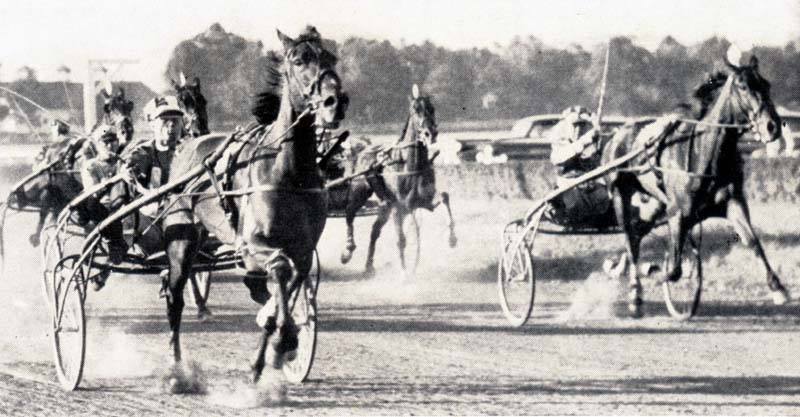
With hindsight Worthy Boy has proved to be a below average sire, especially on the trotting side, but Star’s Pride may just have inherited most of his special talent from his dam anyway. His dam Stardrift was a world record holder for 3-year-old fillies on a half-mile track and won 50 of 116 races for trainers Clint Hodgins and Sam Berger. She was from a very good family which included another world record holder, Calumet Delco, who was exported to Europe where he had an excellent career – and his later covert operations at stud in France is today the source of many trivia articles. It is interesting to note that Arnie Almahurst also hails from the same maternal family.
There are several ways of reading his pedigree. His sire is inbred on Peter the Great while his dam is inbred on Axworthy. He is also 4×3 linebred on San Francisco. That linebreeding on San Francisco may explain his bad feet as he tended to pass on that trait to many of his foals – but also an extreme gameness in racing, something also seen in Star’s Pride. When San Francisco started in the $50,000 handicap at Readville, MA, the richest race at the time, he was clearly unsound and there was a trail of blood drops from his every step. Despite this, San Francisco was still game and finished strongly down the final stretch to only lose by a nose in the end. Star’s Pride had that same extreme gameness and mental toughness.
Star’s Pride died on Dec 13, 1977 and is buried at Hanover. One can argue about who is the best stallion in history, but there is no denying that when it comes to producing winners of the biggest races, nobody can match Star’s Pride. Maybe no-one in history will ever be able to match 8 Hambletonian winners, 1 Hambletonian Oaks winner, 10 Kentucky Futurity winners – and 4 Triple Crown winners.
Star’s Pride
Bay colt born in the US in 1947. Died in Hanover, PA on Dec 13, 1977.
Worthy Boy – Stardrift (Mr McElwyn)
47 starts: 21-15-6 – 1:57.1 / 1.12,8 – $140,969
Breeder: Harry Warwick
Owners: Harry Warwick – E Roland Harriman & Lawrence Sheppard
Trainers: Sep Palin and Harry Pownall
Drivers: Harry Pownall
Groom: –

